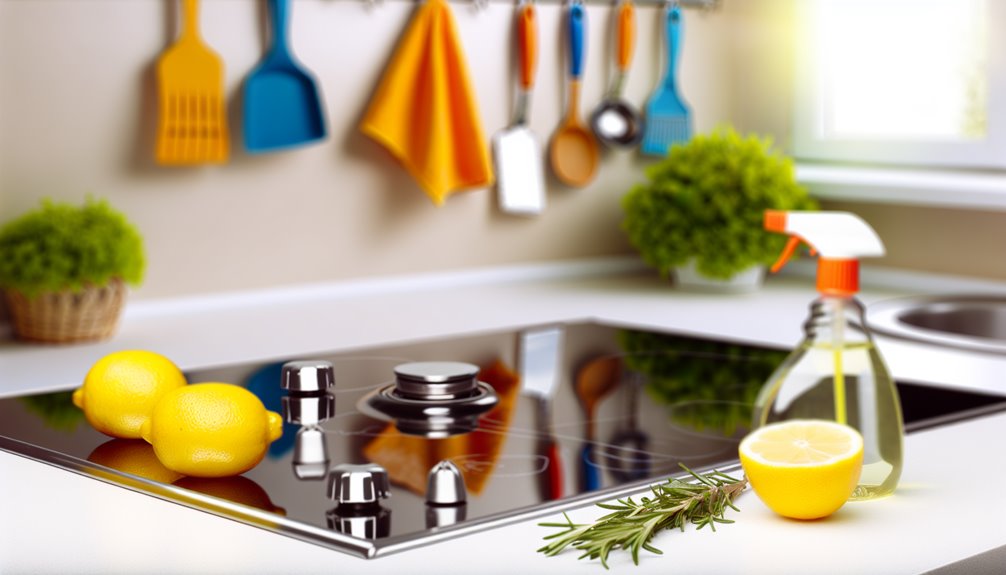You can easily clean your kitchen stove without professional tools. Try mixing baking soda and water into a paste, then spritz with vinegar. Soak greasy parts in hot, soapy water, or scrub with a lemon half coated in salt. For deeper stains, use a hydrogen peroxide and baking soda mix. Finally, polish stainless steel with a bit of olive oil. Keep these tips handy, and discover even more effective cleaning tricks to tackle stubborn grime.
Key Takeaways
- Create a baking soda and water paste, apply it to stains, and spray vinegar for a fizzy clean.
- Soak stove parts in hot soapy water for 15-20 minutes to loosen grease.
- Use a lemon half with salt to scrub stains naturally and enhance shine.
- Mix hydrogen peroxide and baking soda into a paste for tough stains, letting it sit before wiping.
- Polish stainless steel with a small amount of olive oil on a soft cloth for a shiny finish.
Baking Soda and Vinegar Paste
One effective method to tackle stubborn stains on your kitchen stove is by using a baking soda and vinegar paste.
Start by mixing equal parts of baking soda and water to create a thick paste. Apply this paste to the stained areas. The baking soda benefits include its gentle abrasive quality, which helps lift grime without scratching surfaces.
Next, spray or sprinkle vinegar over the paste. The vinegar uses come into play as it reacts with the baking soda, bubbling up and loosening the dirt.
Let the mixture sit for about 15 minutes, then wipe it away with a damp cloth. You’ll be amazed at how easily the stains disappear, leaving your stove looking fresh and clean!
Dish Soap and Hot Water Soak
A simple yet effective method for cleaning your kitchen stove is using a dish soap and hot water soak.
Start by filling a basin or sink with hot water, ensuring it’s not too scalding to handle. Add a generous squirt of dish soap; its grease-cutting properties make it perfect for tackling stuck-on grime.
Let the affected parts of your stove soak for at least 15-20 minutes, which gives the soap time to break down food residues. After soaking, use a soft cloth or sponge to wipe away the loosened mess.
Rinse thoroughly with clean water to remove any soap residue. This method offers great dish soap benefits while being easy on your wallet and your hands—what’s not to love?
Lemon Juice and Salt Scrub
If you’re looking for a natural and effective way to tackle tough stains on your kitchen stove, try a lemon juice and salt scrub.
This simple mixture harnesses the lemon benefits of acidity and antibacterial properties, making it a powerful natural cleaner.
Start by cutting a lemon in half and sprinkling salt on the exposed flesh.
Rub the lemon over the stained areas of your stove, letting the salt gently scrub away grime while the lemon juice works to break down stains.
After scrubbing, let the mixture sit for about 10 minutes, then wipe it clean with a damp cloth.
You’ll find that this eco-friendly solution leaves your stove shining without harsh chemicals, proving that natural can be effective!
Hydrogen Peroxide and Baking Soda Combo
The hydrogen peroxide and baking soda combo is a powerhouse for tackling stubborn stains on your kitchen stove.
To use this effective mixture, combine equal parts of hydrogen peroxide and baking soda to create a paste. Apply it to the stained areas and let it sit for about 15 minutes.
The hydrogen benefits include breaking down grease and grime, while baking soda gently scrubs away residue without scratching your surfaces.
After the wait, wipe away the paste with a damp cloth, revealing a clean stove beneath.
Remember, while hydrogen peroxide is generally safe for household cleaning, always follow peroxide safety guidelines by wearing gloves and ensuring proper ventilation.
This method is simple, effective, and safe for regular use!
Olive Oil for Polishing Stainless Steel
While many people overlook natural solutions, olive oil can work wonders for polishing stainless steel surfaces in your kitchen. Not only does it enhance shine, but it also offers several olive oil benefits for stainless steel maintenance:
- Natural Shine: Olive oil effectively brings out the luster of your stainless steel appliances.
- Residue-Free: Unlike some commercial cleaners, it doesn’t leave behind harsh chemicals.
- Protection: It forms a light barrier, helping to repel dust and fingerprints.
- Easy Application: Just a small amount on a soft cloth will do the trick.
Simply apply the oil, buff gently, and watch your stainless steel gleam like new!
Using olive oil is a simple, eco-friendly option for keeping your kitchen looking its best.
Frequently Asked Questions
How Often Should I Clean My Kitchen Stove?
You should clean your kitchen stove regularly to guarantee proper maintenance. Aim for a quick wipe after each use, and do a deeper clean weekly. This cleaning frequency keeps your stove in top condition and prevents buildup.
Can I Use These Methods on Any Stove Type?
You can apply these methods on various stoves, including induction stoves and gas stoves. Just remember, each surface might need a slight tweak, but cleanliness conquers all cooking challenges in your kitchen!
What if My Stove Has Tough Stains?
If you’re facing tough stains, try heavy-duty cleaners specifically designed for tough stain removal. Apply them according to instructions, and don’t forget to scrub gently to protect your stove’s surface while ensuring effective cleaning.
Are These Cleaning Methods Safe for Food Surfaces?
Sure, you could use bleach on your food surfaces—if you enjoy a side of chemical flavor! Stick to gentle, food-safe cleaners that respect your stove’s surface materials and guarantee your food safety. Your taste buds will thank you!
How Can I Prevent Future Stains on My Stove?
To prevent future stains on your stove, use a stove cover when cooking and perform regular maintenance. Clean spills immediately and avoid using harsh chemicals that can damage the surface, ensuring your stove stays pristine.



